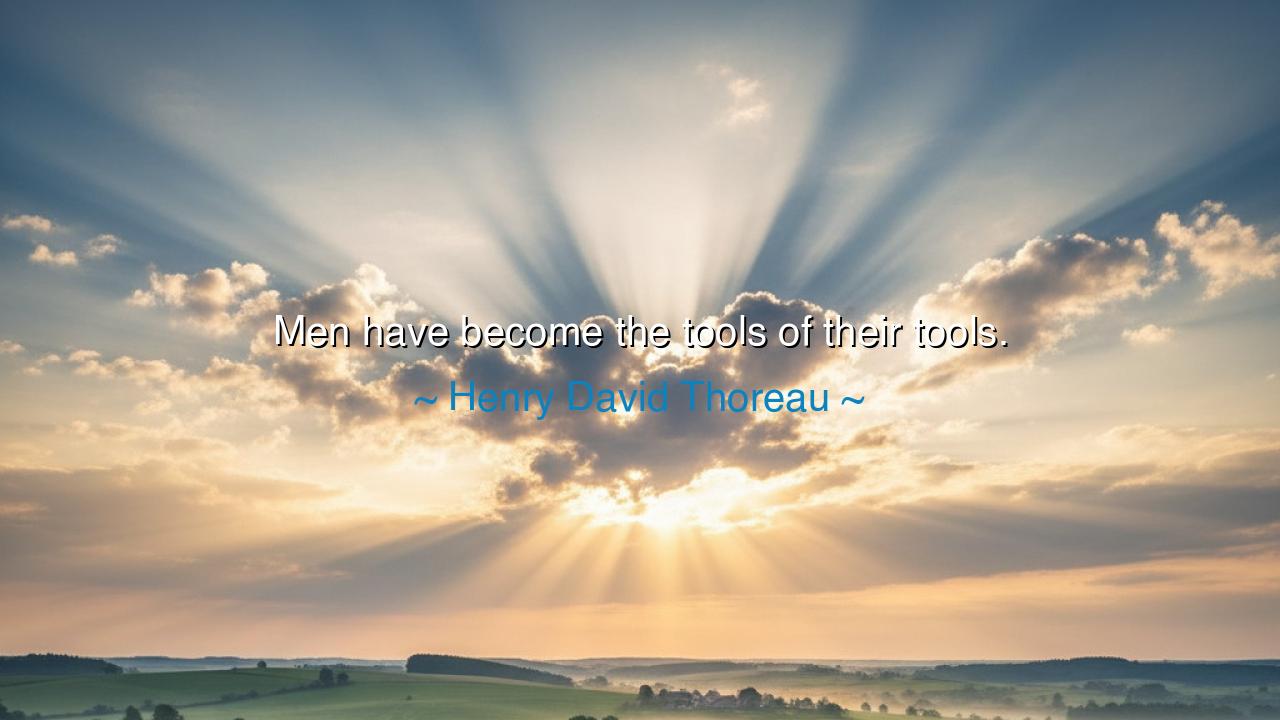
Men have become the tools of their tools.






"Men have become the tools of their tools." These words, spoken by the great philosopher and naturalist Henry David Thoreau, carry with them a profound warning about the dangers of technology, materialism, and the loss of human autonomy. Thoreau, who lived simply and sought a life in harmony with nature, understood that the tools we create—whether physical, social, or technological—have the potential to control us rather than serve us. His words urge us to reflect on the way we live in the world: Are we in charge of the tools we create, or have we allowed those very tools to shape our lives, our values, and our very essence?
In the ancient world, the philosophers spoke often of the dangers of being controlled by the very things that are meant to serve us. The Greeks warned against excessive materialism, believing that true happiness was found not in the accumulation of wealth or the creation of things, but in the pursuit of wisdom and the cultivation of virtue. Socrates, for example, lived simply, seeking knowledge through dialogue and reflection rather than through the acquisition of possessions. He understood that a man who is driven by the pursuit of external goods is at the mercy of those things. In a way, Thoreau's words echo the ancient teachings: when we allow our tools—be they wealth, technology, or status—to control us, we lose the very freedom that should come with mastery over them.
Consider the story of Prometheus, the titan who gave fire to humanity, thereby granting civilization its power. While fire was a gift, it came with consequences. Prometheus did not foresee that the gift of fire would also lead to war, destruction, and exploitation. Tools, when used without wisdom, can become forces of chaos. Just as fire can warm a home or destroy a city, the tools we create can both uplift and enslave us. Thoreau’s statement about men becoming the tools of their tools reflects this timeless truth: the more we create, the more we risk losing control over our creations. Technology, for all its wonders, can also imprison us, as it has increasingly done in the modern world, where people are often captivated by their devices, unable to live without them.
The rise of industrialization in the 19th century provides a poignant example of this shift. Factories and machines promised efficiency and abundance, but at a great cost. Workers, once individuals with skills and autonomy, became mere cogs in the vast machinery of production. Thoreau saw this transformation with alarm, recognizing that humans were becoming servants to the very machines they had built. Instead of using tools to enhance their lives, people were allowing tools to define their existence, losing touch with the deeper rhythms of nature, simplicity, and self-determination.
In our own time, the advent of the digital age has made Thoreau’s warning all the more relevant. We have become dependent on our smartphones, computers, and social media, often allowing these tools to shape our interactions, our perceptions, and even our emotions. Just as the industrial age stripped workers of their autonomy, so too does the digital age strip us of our attention, our privacy, and our time. We become enslaved to the notifications that buzz and the endless stream of information that demands our focus. In the quest for convenience, we may have created tools that now control us, guiding our actions and emotions, making us less connected to the present moment and more dependent on the next update, the next click, the next distraction.
The lesson Thoreau imparts is clear: we must regain control over the tools we create. Rather than allowing technology to dictate our lives, we must use it with intention, mindfulness, and wisdom. Just as the ancient Stoics believed that virtue was achieved through the mastery of one’s inner life, so must we master the tools we use, ensuring they serve us and not the other way around. This may mean embracing simpler ways of living, just as Thoreau did in his time at Walden Pond, where he lived deliberately and distanced himself from the distractions of the world.
To regain autonomy, we must learn to pause and reflect. How often do we allow ourselves time to simply be present, to think, to observe, to breathe without the constant pull of our tools? Take time each day to disconnect—not just from your devices but from the noise of the world—and reconnect with the natural rhythms of life. Slow down, and ask yourself: Are you using your tools, or are they using you? By reclaiming our relationship with our tools, we can regain our freedom and live lives of purpose, not driven by the rush of constant production but by the wisdom of living thoughtfully and intentionally. In this way, we will no longer be the tools of our tools but their masters, creating a world that serves our deepest values and desires.






AAdministratorAdministrator
Welcome, honored guests. Please leave a comment, we will respond soon